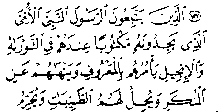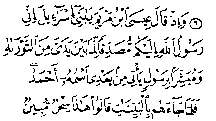Is there a Prediction of Muhammad in the Taurat?


 Al A'raf 7:157
Al A'raf 7:157
"Those who follow the apostle, the unlettered Prophet, whom they find mentioned in the Taurat and the Injil..."
 Al Saff 61:6
Al Saff 61:6
"...Jesus, the son of Mary said: 'O children of Israel! I am the apostle of Allah (sent) to you, confirming the Taurat (which came) before me and giving glad tidings of an apostle to come after me, whose name shall be Ahmad'."
Click here to download a Windows 'Help' version of this document.
In order to support their claim, Muslim apologists have tried to list the criteria that Moses and Muhammad share, saying that both were married and had children, both led battles, both were leaders, etc. What they fail to realise is that any prophet could claim many of these parallels for himself. A handier method would be to identify those attributes which Moses fulfilled which were unique to his ministry and which would necessarily be unique to the One who is "a Prophet like you (Moses)."
Consider these nine comparisons:
| Moses | Muhammad | Jesus |
| The baby Moses was saved by God (Exodus 1:17; Exodus 2:2-10). | Muhammad was not saved as a baby. Is he like Moses? | The Baby Jesus was saved by God (Matthew 2:16). Isn't he like Moses? |
| Moses had a personal relationship with God (Exodus 16:15; 33:13-14; Numbers 9:8-9) | God is distant and unknown according to the prophet Muhammad. He never spoke directly with God. Is he like Moses? | Jesus was in the presence of God (Matthew 17:2-8). Isn't he like Moses? |
| God established Moses in authority like God (Exodus 4:16; 7:1). | Nowhere in the Qur'an did God expressly say to Muhammad, "You are like God." Is he like Moses? | Jesus was like God in authority: he forgave sins (only God can forgive sins) (Mark 2:5). Isn't he like Moses? |
| Moses was testified by God in the sight of all his people and performed miracles to give him authority (Exodus 7:10-20; 8-12; 9:3-15; 12:29; 14:21-22; 17:6-7; 19:9; 19:17-19; 20:18-22; Deuteronomy 4:10-16; 5:23-26). | Nowhere in the Qur'an did God testify for Muhammad in the sight of all his people. He himself said of his critics that since they pronounced not witnesses, they are liars (Sura 24:13). Except for the Qur'an, he performed no miracles. Is he like Moses (Sura 29:50)? | The Holy prophet Jesus was testified to by God in the sight of all His people and performed many miracles (Matthew 5:8; 8:14ff; 14:13; Luke 7:11). Isn't he like Moses? |
| Moses was transfigured on the occasion of his exposition before God and his face shone (Exodus 34:29). His followers, therefore, feared him; but he called them with love and told them the Word of God (Exodus 23:29-32). | Nowhere in the Qur'an is Muhammad ever transfigured. After the angel Gabriel spoke to him we see no such phenomenal sign. His followers honoured him by believing his authority and not God's. Is he like Moses? | Jesus was transfigured and his whole appearance shone. His disciples, therefore, feared him, but he talked to them about about the Word of God revealed in the moment (Mark 9:2,5; Luke 9:29,34; Matthew 17:1-7). Isn't he like Moses? |
| Moses prophecied events which were fulfilled (Deuteronomy 18:15-22; 28:15-29,67). | Except for alluding to battle victories, Muhammad never prophecied specific events which were fulfilled. Is he like Moses? | Jesus prophecied events that were fulfilled (Matthew 24). Isn't he like Moses? |
| Moses offered himself before God to take upon himself the sins of all the people (atonement) (Exodus 32:30-32). | Nowhere in the Qur'an does the prophet Muhammad offer himself to be an atonement for the sins of his people. Is he like Moses? | Jesus offered himself on the cross to take upon himself the sins of all humanity (atonement) (Isaiah 53:5; Matthew 26:28). Isn't he like Moses? |
| Moses ordained a religion made up of mercy and the justice of God (Exodus 32:30-32) and later added the forgiveness of sins, by means of an offering for sins - a lamb - in order to be reconciled with God (Leviticus 4:2; 6:24-25; 14:13-lamb; Exodus 12:5; 13-lamb). | The prophet Muhammad was openly against the shedding of the blood of a lamb, and taught that sacrifice for one's sins doesn't bring forgiveness (Sura Al An'am 6:164; Al Najm 53:38; note also Yusuf Ali number 543). Is he like Moses? | Jesus fulfilled the forgiveness for sins by his own death, "as the final Lamb of God," so that all who believe in His innocent sacrifice have forgiveness for their sins. He is the perfect sacrifice which lasts forever (Hebrews 9:22). Isn't he like Moses? |
| Moses was descended from the prophetic line of Jacob, the son of Isaac (Exodus 2:1; 3:15). | Muhammad was a descendent of Ishmael (as the Muslims claim), not Jacob. Is he like Moses? | Jesus is descended from Jacob by both Joseph and Mary (Matthew 1:2,16; Luke 3:23,34). Isn't he like Moses? |
More importantly, the mission of Muhammad was nothing like that of Moses and Jesus, for it was Moses and Jesus who offered themselves as a sacrifice for the sins of their people (Exodus 32:30-32; Deuteronomy 34:10-12; Matthew 26:28).
Most significantly, however, is the fact that, beginning with Moses and ending with Jesus, the means of forgiveness and reconciliation with God were brought about (Leviticus 4:2; 6:24,25; 14;13 and Hebrew 19:22). This is the real criteria for "a Prophet who is like you (Moses)." Many prophets can claim to be like Moses from the standpoint of human reasoning. Only one can claim to be like Moses from the standpoint of God's reasoning. His desire to save mankind, which Moses first began by bringing the Children of Israel out of captivity from Egypt, and which Jesus finally accomplished by bringing all believers out of captivity from sin 2,000 years ago.
At the heart of the argument, for a Muslim, is the desire to find any external predictions for the coming of Muhammad in the Taurat and the Injil as referred to in Sura 7:157. Without it, the only criteria for Muhammad's authority is the Qur'an, while the only authority for the Qur'an is Muhammad. This is circular reasoning, which is not a valid scholarly argument. Since the evidence for any prediction by Moses concerning Muhammad does not exist in the Taurat, this creates a problem for Muslims who must produce external criteria for the authenticity of their prophet. Without it, Muhammad has no outside evidence to prove his prophethood.
Furthermore, internally, the Qur'an claims (Sura 29:27) that prophethood belongs solely to the line of Isaac and Jacob, of which Muhammad has no part. Consequently, the authority for the beliefs of over one billion Muslims hangs on the single testimony of one finite man. This solitary man himself admitted his lack of power (Sura 20:49) and sinfulness (Sura 40:55) in contrast with the claim by Jesus to have all power (Matthew 28:18) and to be without sin (I Peter 2:22).
As you read these verses and consider what has been said, you too must come to a conclusion. Based on the evidence before you, you must decide who indeed is the person spoken of in the Taurat, Deuteronomy 18:18: Muhammad or Jesus.
![[99 Truth Tracts]](logo.gif)
This pamphlet was compiled by an interdenominational group of evangelical Christians concerned with Muslim-Christian dialogue.